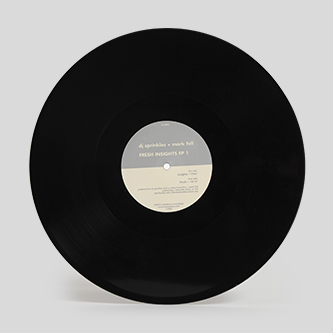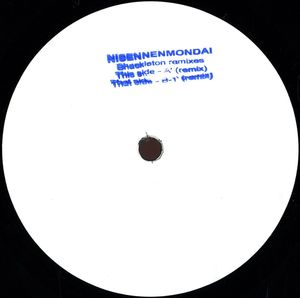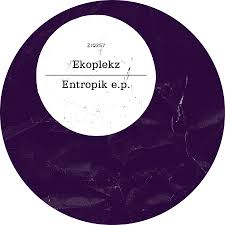And thus arrives the first of these columns for six months or so, following my own extended hiatus from thinking about, writing about and, for the most part, listening to music. Keeping the introductory spiel relatively short, one opening reflection for this reboot edition of Hyperspecific: with the daily glut of podcasts and mixes, radio and free-to-download tracks, 2015 so far has emphasised that it’s never been easier to be a committed music fan without spending any money whatsoever. A bittersweet fact, of course: there are pressing questions and challenges to be addressed about the long-term economic viability of music-making as a career, especially for artists without a financial safety net to fall back upon. But sidestepping those for a second – perhaps flippantly – to focus on one positive aspect, I could easily have opted to write this entire column on radio shows I’ve listened to in the past few weeks.
At a time of online plenty and ease of access, radio currently feels like a particularly important medium. In part, as ever, that’s because it acts as guidance – a well-curated show can be a gateway to discovering a wealth of new music. But it’s also due to the breathing space it provides. Web-acquired mp3s, in the absence of artwork or other accompanying materials, perhaps inevitably tend to offer semi-anonymised listening experiences, linked to the artist in question mainly by the files’ metadata. This is especially the case with digital promos sent to writers, and speaking personally I’ve noticed that too much of this airless, peculiarly 2D listening experience can have a definite effect upon my perception of the music itself. (I should, however, point out that I am not in any way anti-mp3).
Radio shows, podcasts and memorable DJ mixes shatter that anonymity; via track selection, idiosyncrasies of arrangement and mixing, and accompanying voiceovers, at best they draw you indisputably into another person’s presence. There’s certainly little I’ve enjoyed this month more than hearing Ralph Cumbers, aka Bass Clef, reading a passage from Jorge Luis Borges live on NTS during the first of his regular Floating World Music shows, or PAN’s February Rinse FM show, which premiered Amnesia Scanner’s radio play Angels Rig Hook, and also included a wonderfully melodramatic embedding of Puff Daddy’s ‘No Way Out (Intro)’ within a buckling mesh of splintered glass and steely drones. With that in mind, I’ve decided to consciously expand this column’s remit to include more mixes, radio, podcasts and other extended format musical statements; expect to see them featuring much more heavily in future.
Nidia Minaj – Danger
(Principe Discos)
Principe Discos w/ DJ Marfox & Nidia Minaj – Rinse FM, 7th February
(Rinse FM podcast)
Each release from Lisbon’s Principe Discos feels like an event, which is testament both to the attention they lavish on their records’ presentation, and to the breakneck thrills of the music emerging from their home city at the moment. Bizarrely catchy and rhythmically wayward, the kuduro-and-related bass mutations of producers like DJs Marfox and Nigga Fox and the Tia Maria Producoes crew run amok with contrasting sensations: in sound their beats feel lo-fi yet are simultaneously boxfresh and spine-snappingly crisp, while their delirious, tumble-dryer rhythms, which could appear at first awkward, in the dance are revealed to be precision-tooled interfaces between computer and body, jacking in and triggering hell to break loose. The debut 12” from Nidia Minaj (pictured above), born in Portugal but living in Bordeaux, might just be the label’s most striking to date. Her music is dazzling in all senses, a trance-inducing tangle of boxy drums, vivid swirls of synthetic melody and buzzsaw grime bass, all corralled into tracks that feel less like functional dancefloor units and more like short, sharp shocks of adrenaline. ‘Afro Master’ and ‘House Kaliente’ explode into action one minute, strafe the senses, then vanish as swiftly as they arrived.
There was a particular time a few years ago, with the initial emergence of UK funky, where something roughly kindred in atmosphere was happening in London dance music. The stiff, gunfire rhythms of grime had softened like melting wax into lilting, carnivalesque sprays of struck melody and necksnap snares – pure joy on a dancefloor – yet they retained their parent genre’s sonic sensibilities: the bass tones’ slightly anarchic and off-kilter feel; the eerie melancholy generated by slight harmonic mismatches; the unfiltered, unpolished sound which often heightened the music’s emotional charge. All too quickly, funky’s initial incarnations had their wilder edges pared away, largely evolving into straight-up house. But for me, one of the reasons why the music Principe is providing a platform for – and Danger in particular – feels so exciting is that it’s charged with very similar energy. Powering Minaj’s ‘Estudio da Mana Casa’ and ‘Mambos Fudiz’ is the same rough and tumble of contradictions that formed UK funky’s engine room, with brusqueness squaring off against tenderness, and tough, bone-dry textures corralled into liquid grooves.
It was fitting, then, that February saw Principe Discos take over the rotating Saturday night slot on Rinse FM for a series of shows covering the breadth of the label’s influences – Angolan and Portuguese musics, house, garage rock, plenty of kuduro, and guest mixes from producers including scene leader DJ Marfox, Minaj, DJ Firmeza, DJ Lilocox and more. The first, with Marfox and Minaj, is a particularly thrilling two hours, with the battering-ram intensity of the former’s mix a distinct contrast to the splayed-out, lopsided character of Minaj’s beats. Beyond Rinse’s airwaves, it’d be exciting to experience more of this music on UK dancefloors in the near future; with any luck some of its infectious joie de vivre will seep out and trigger mutations in some of our less rhythmically daring homegrown bass sounds.
DJ Sprinkles & Mark Fell – Fresh Insights
(Comatonse)

“The older I get the more I realise that every generation has to fight the same battles, again, and again, and again. There’s no final victory, and there’s no final defeat.” These words, spoken by the late MP Tony Benn and set to Sprinkles and Fell’s fabulously glossy splashes of texture-as-melody-as-texture, have been rattling around in my head since the release of Fresh Insights a few weeks back. As with the duo’s The Complete Spiral EP, which similarly sampled Arthur Scargill’s speech from during the miners’ strike, here the pair’s collaborative house tracks are as much a treat for the senses as you’d imagine given their respective musical histories: the propulsive NY house shuffle characteristic of Terre Thaemlitz’s work, spun from webs of the translucent, synthetic chordstuff that animates Fell’s clubbier side and his limb-twisting Sensate Focus tracks – deft, delicate yet bitingly acidic in tone, a tangle of impulses complex enough to make your head spin. It’s there in the acerbic humour of the title, Fresh Insights, with Benn’s words as resonant as ever now: “do we really need to be reminded of this stuff again?,” the pair seem to be asking, half amused, mostly incredulous.
I can’t help, too, but hear it as a quiet skewering of the inward-looking, depoliticised state of much of the contemporary ecology of experimental and dance music, made vulnerable by the collapse of viable income streams and left often unwilling to critique itself, or indeed to offer much more than a marketable token acknowledgement of the systemic problems of the political and financial systems in which it is entangled, and on which it is dependent. Save the occasional damning reflection on the status quo – Thaemlitz’s ever-insightful music and writing, records like Ghettoville, Jar Moff’s strung-out Financial Glam, or the work of Inga Copeland and Dean Blunt – there’s fairly little in current experimental music that explores ideas of change or considers strategies of resistance; often simpler and less daunting, perhaps, to erect a cocoon in which to exist, away from the surrounding world. This may go some way towards explaining the widespread shock and indignation felt when events – such as London club closures and the recent review of Fabric’s license (and, indeed, a similar scenario with the now sadly departed Plastic People a few years ago) – conspire to stick a pin in that bubble and allow a flicker of the deafening clamour outside to come rushing in. Fresh Insights seems to cast a wary yet playful eye over all of this, while packing enough bump to swiftly pinball a dancefloor into motion; it’s certainly noteworthy that a speech from Benn set to a feather-delicate house beat is among the more politically rousing musical statements I’ve heard for a while.
Nisennenmondai – Shackleton remixes
(Woe To The Septic Heart)

Surely a match dreamed up by dark, heavenly forces. Nisennenmondai, at their current live best, render well-known tools strange, with drums, bass and guitar wielded to create the anxious sense of being trapped between mirrors, with time telescoping outwards into a near-infinitely long tunnel. The uncanny in Sam Shackleton’s music emerges from his taking this approach one step further; in these remixes the same familiar sounds and textures that remain intimately connected to human gestures – the ripple of a plectrum over open strings, hi-hats that stammer and buck as if played by shaking hands – are wrenched further out of context, dropped into an environment to which they are strangers. On ‘B-1’ everything is intermeshed tightly into a dynamic, churning mass of acoustic and synthetic elements, to the extent that it’s barely possible to tell where Nisennenmondai end and Shackleton begins (or vice versa). The effect is endlessly fascinating and occasionally outright creepy, during the phases when the chugging rhythmic backbone frays and peels apart, and licks of raw guitar distortion drift upwards, delicate yet threatening, like plumes of smoke from a long-dormant volcano.
While sampled choral song and devotional chant has long been a familiar feature of his work, more and more Shackleton appears to be moving towards a form of superheated meditational music: ‘A’ features those familiar, tumbling church organ notes that crash downward in doomy, diminished cadences, while on ‘B-1’ he shrouds his distinctive drums-and-bass backbone in a resonant mist of bell-like struck metal instruments, gongs and singing bowls. You wonder, just as Indonesian gamelan evolved to both reflect upon and blend seamlessly into the sounds of its tropical forest surroundings, what sort of external or inner environment Shackleton is working to conjure up here. It’s equally interesting to listen to these tracks alongside the equally churchy feel of a lot of new ‘weightless’ grime and internetty electronica – where much of the latter wields drastic contrasts between silence and pummelling volume to create a mood of high drama (even in cases when there’s very little really going on), the continuous, riverlike ebb and flow of of Shackleton’s tracks is subtler in its efforts to capture and hypnotise, and remains among the most rewarding of current electronic music.
Ekoplekz – Entropik
(Planet Mu)

I’ve long been a paid-up fan of Nick Edwards’ music, for its soft rains of decayed-tape crackle and sudden eruptions of flesh-raw noise, for the nagging suspicion that Edwards is just as unsure as his listeners what direction a track’s going to take next – but this is something else. His music, especially in a live setting, has always felt like cutting downward into a moment in time; catching onto a fleeting emotion or mood, allowing it to take control, and gradually being drawn deeper and deeper until you can barely remember what ‘before’ felt like – something he shares with Sasu Ripatti, another traveller taking graceful, dub-inspired inward dives. Entropik grabs those sensations and runs wild with them. Among the longest pieces of music Edwards has released to date, its two thirteen-minute tracks are fantastically heady, sprawling plunges into alternative-reality space. The mind-frying churn of ‘Entropy Flash’ (which I can’t help but also read as a callback response to sometime collaborator Bass Clef’s ‘Apathy Flash’) reminds me in particular of the baked haze of James Ferraro’s career-best Last American Hero, but with that record’s striplit mega-marts and sun-scorched Nowheresvilles relocated to the drizzly backdrop of UK semi-urban space.
As with Ferraro’s reflections on the inherent surreality of the hidden wasteful processes underpinning US society, here Edwards’ music feels like an invitation to step into the background of the contemporary UK city, its alleyways, industrial parks and dumps, and be reminded that the same knackered infrastructure, inefficiencies and environmentally damaging processes still churn away behind the slick 21st century surface veneer. In ‘Entropy Symphony’ I hear a Disney’s Fantasia for municipal waste: the bell-like chimes of toxic effluent dripping from a pipe; discarded polystyrene cups, plastic bags and rusted trolleys skating an intricate ballet on the surface of a duckweed-ridden canal; blasts of Geiger-counter grit a warning of the invisible radiation of the past leaking out to deform and hack away at the gloss of the present. It may be projection on my part, but as someone living in London at the moment these jarring contradictions form a part of everyday life: rising homelessness and overt poverty juxtaposed with endless aspirational billboards for new housing developments, slick shopfronts and overpriced organic supermarkets. These all add to the sickened sense that your home city is on display for purchase by anyone save those of its current inhabitants most in need of housing; spruced up like a toy dog at a show competition, its imperfections temporarily varnished over or swept aside, away from the eyes of prospective buyers. Somehow, though, Entropik is a comforting reminder that underlying damp always seeps back through the fresh coats of paint slapped on to cover it.
DJ Bone – Mix For Resident Advisor
(free download)
DJ Bone Presents Differ-Ent
(Don’t Be Afraid)
Every time the needle drops on a record by Eric Dulan, aka DJ Bone, my mind immediately teleports back into the thick of one of the Detroit veteran’s DJ sets, jackhammer-heavy yet dreamlike three-deck affairs mixed with an almost painterly sensibility: layering up multiple rhythms into dense, sandy lattices of texture luscious enough to wade through, blending through daubs and swirls of synthetic colour, and lacing the surface with flourishes and fine details captured from jazz, African musics, soul, and his own spoken word. The effect, at 5am, is to be led joyfully out-of-body, with your motor system hijacked by streams of contrasting sensory information, zigzagging from warm and skin-soft to harsh and unrelenting. Plenty of mixes on Dulan’s Soundcloud have a similar effect (inevitably dulled by the prosaic reality of the everyday world that they’re overlaid onto when listening through headphones on the street or at home), but his recent mix for Resident Advisor is a particularly distracting, vertigo-inducing 90 minutes; unlike any number of wallpaper-paste techno mixes, I defy you to concentrate on anything else while it’s playing. Graced with a scattering of recently released and hopefully upcoming DJ Bone tracks – ‘Detroit Is Hard’, ‘Differ-Enthrall’, the magnificent ‘Cultural Variance’, an unnamed choppy manifesto of a spoken word track that swoops in 30 minutes through – it’s the subtleties that keep me returning; the way he sneaks Basic Channel’s centrifugal ‘Octagon’ into the mix almost casually around the hour mark, before easing it equally slowly into the backdrop to command the mix’s topography for several minutes, manages that rare feat of being virtuosic yet entirely unshowy about it, and simultaneously so viscerally exciting it’s difficult to resist the temptation to gasp out loud.
Mirroring his mixing style, Dulan assembles his own music segment by segment, layer by layer, slotting new percussive adornment and textural mutation into place every few bars, lending his tracks the feel of a many-limbed organism evolving over time to adapt to changing circumstances. On the heels of his recent Detroit Part I and Cultural Variance 12”s, and adding up to a particularly sweet current run of form, his debut as Differ-Ent for DBA captures that aesthetic in characteristically dynamic motion: ‘Differ-Enthrall’s mean trajectory is dagger-straight, yet along the way it chops and changes tack with a turntablist feel, its springy, acidic core melody darting from side to side like a soaring bird buffeted by shifting wind currents.
Insanlar – Kime Ne
(Honest Jon’s)

Honest Jon’s have been responsible for a tryptich of remarkable releases so far in 2015: Sex Tags boss DJ Sotofett’s Drippin’ For A Tripp, Kassem Mosse’s Simone White reversions (which if anything sound even better spun at 33 than at the cut 45, a switch-up I thoroughly recommend), and this, probably my single most-played record of this year to date. Turkish trio Insanlar’s ‘Kime Ne’ was originally released in 2013 on Istanbul label Aboov Plak, and this vinyl reissue is beautifully curated in that it wisely leaves as much space as possible for the track itself to breathe: a gorgeous 24-minute exercise in gradually unfurling tension, ‘Kime Ne’ demands your total attention, not least because the way the balance of energy shifts between players across its length is blink-and-you’ll-miss-it subtle. One moment it’s exquisitely melancholic, liquefied desert blues, its snakelocked bağlama melodies coiling slowly around the weary, heavy-hearted footfall of a drum machine; the next it’s morphed something approximating acid-flecked disco cast in extreme slo-mo; before all its energies gather and escalate into a full-bore psychic meltdown of a second half that spits you out at track’s end, exhausted, elated, and compelled to immediately flick the needle back to track’s start and relive the experience.
With that in mind, Honest Jon’s’ choice to draft in Ricardo Villalobos as accompanying remixer makes sense; the original is just the kind of wild, uncategorisable freakout music he’s renowned for drawing upon during a dancefloor’s most lost hours. True to form, rather than offering radical revisionings, his two versions – probably my favourite music from him since 2008’s Vasco EP – opt to voyage still further outward into the same arid wilderness, and to capture you for eons in collapsing space between spring reverbs, percussive hits that splinter along pathways to nowhere, and meditative eddies of struck instrumentation. If anything, his treatment of ‘Kime Ne’ reminds me of his similarly subtle but monolithic take on Shackleton’s ‘Blood On My Hands’. Both offer fresh reflections on a tough-to-better original, but both also capture Villalobos’ aesthetic at its most vibrant – when his compulsive fascination for recorded sound’s most intricate nuances is channeled not into drily workmanlike drug grooves, but wild, elemental sound worlds that open and close around you like shifting sand dunes.
Peverelist – 12,000 Seconds
(Magic + Dreams)
This mini-album from Pev was sorely overlooked come last year’s end, perhaps because its release on Bass Clef’s Magic + Dreams label arrived with what felt like an absolute minimum of fanfare. Following a couple of years of Livity Sound live shows and collaborative records with Asusu, Hodge and Kowton, in 12,000 Seconds it’s a pleasure just to hear Tom Ford in solo mode. Alongside Shackleton, his remains the most distinctive and idiosyncratic voice to have emerged from the dubstep milieu, and equally recognisable in the mix: those heat-shimmer cymbals that emerge during the opening haze of ‘Caught A Glimpse’ are as much a dead giveaway as the sheets of kaleidoscopic synth-drone that shower through the track’s superstructure a few seconds later.
Ford’s 2009 debut album Jarvik Mindstate still remains a vital and delightfully dizzying listen – the title track’s unsettling sensation of time being folded over on itself in a thousand origami-like configurations is just as startling as it was on initial release – so it’s especially interesting to listen to 12,000 Seconds alongside: to consider what’s remained constant in his sound (the sneaky, sidewinding groove of ‘Caught A Glimpse’, the fizzing firework trails of ‘OK Run It’), but also what’s evolved. While equally exploratory and expressive, there’s an ease and confidence to these newer tracks that pushes their emotional core right into the foreground, with Ford’s melodies often recalling the cryptic yet warm and woozy reflections of early Planet Mu and Rephlex releases. In the triumphant digi-dub brass blasts of highlight ‘Kinetics’, it’s also tempting to imagine he’s drawing some influence from the Bristol dance music scene’s recent renewed love affair with steppers’ reggae and dub (via contemporaries like Young Echo’s Ishan Sound and the Peng Sound crew); at least, that is, until it plunges headlong into a hailstorm of tuned drums and frazzled melodies that’s held tightly under control yet feels wholly unhinged, and you’re reminded again that very few others make dance music sound as weird and joyful as this right now.
Levon Vincent – Levon Vincent
(Novel Sound)

One of the subliminal undercurrents running through the post-minimal techno musical landscape has been an implicit awareness of the power of tiny sonic gestures to convey a disproportionate amount of emotion. What’s always been a pleasure about Levon Vincent’s work, and equally that of contemporaries like Kassem Mosse and Lowtec, is its sense that nothing is extraneous to purpose – every sound object in the mix (sometimes very few indeed) is present only because it needs to be, to carry the mood or groove – yet it very rarely retreats into insular headspace, remaining open and generous in spirit: anti-austerity music. Little demonstrates this better than ‘Launch Ramp To Tha Sky’, the spaced-out, lovelorn centrepiece to Vincent’s debut album. Just a chiming melody line, a soft fog of harmonic feedback and a fuzzy drum machine beat stretched over eleven minutes, it nonetheless feels like the musical equivalent of the cosmos stretching out to give you a massive, warm hug – especially when it goes supernova in its final minutes, as the beat melts away and light streams outward in all directions.
This atmosphere has long been present in Vincent’s work, whether musically or in overall approach. His Fabric mix CD featured exclusively tracks from his friends and NY contemporaries and gave the world its first substantial glimpse of Joey Anderson’s music; he regularly re-presses his Novel Sound 12” releases to meet demand; and he gave away the digital version of this album through WeTransfer the day before its vinyl release. There’s no one track on Levon Vincent that matches the volcanic shitstorms of earlier tracks ‘Double Jointed Sex Freak’ or ‘Six Figures’ for sheer force; in fairness, it’d be tough to match the latter’s electrifying effect on a club, its distorted cello slashes triggering entire roomfuls of people to jerk and vamp in time like Hammer Horror monsters. But in keeping with the openness of its maker’s approach, it feels intended to creep up on you. Deceptively simple in composition terms yet executed beautifully, its best tracks expand upon the shimmery, electro-pop inspired aspect that’s formed an alternative history of Vincent’s music: ‘The Beginning’ riffs on The Human League and Chris & Cosey, the weightless shimmer of ’For Mona, My Beloved Cat, Rest In Peace’ is a direction I’d love to hear Vincent pursue more in future, while closer ‘Woman Is An Angel’ does that steroidal, dubbed-out string quartet thing to convey a sense of euphoria rather than menace. Again, it’s each track’s subtle, almost offhand asymmetries – ’The Beginning’ fading out into a minute of dazed synth noodling, the way the hi-hats in ‘Black Arm W/ Wolf’ whistle like leaves in a breeze – that make Levon Vincent so quietly rewarding. Standing out especially in contrast to the anonymised, production line feel of plenty of club-centred techno, they’re a glimpse into its maker’s mindset at time of writing: when ‘Launch Ramp’ dissolves come track’s end, you can almost see Vincent’s face breaking out into a wide grin.



